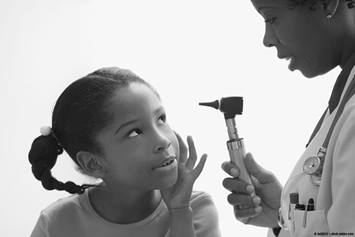Allergic Rhinitis
Allergic rhinitis is a common condition caused by an abnormal reaction of the body’s immune system response to various particles in the environment.
What Is Allergic Rhinitis?
Allergic rhinitis is a very common condition caused by an abnormal reaction of the body’s immune system response to various particles (allergens) in the environment. In this condition, the nasal lining can become very inflamed and swollen from the over-response of the body. The lining of the nose often over-secretes excessive amounts of mucus when exposed to provoking allergens. This condition can be worse in some seasons for some children or can be present throughout the entire year in other children. Common examples of allergens for children include dust, grasses, pollens, mold, trees, and dog and cat dander. Children with allergic rhinitis may also have conditions like asthma or eczema of the skin. It is common for allergic rhinitis to run in families, as this condition can be passed from parents to their children.
What Are the Symptoms of Allergic Rhinitis?
Allergic rhinitis typically presents as difficulty breathing through the nose (nasal congestion/obstruction) as well as frequent mucus drainage from the front of the nose or down back of the throat (post-nasal drip). Postnasal drip can occur during the day and at night and can contribute to frequent coughing in children. Allergies can also affect the eyes and cause itchy, watery eyes, as well as increased mucus secretion from the eyes.
What Treatment Options Are Available for Allergic Rhinitis?
Treatment of allergic rhinitis primarily involves avoiding exposure to the things that cause symptoms. Allergy testing can help to determine which allergens cause the most problems. Your doctor can discuss avoidance measures with you depending on the things your child is allergic to.
Medical treatments for allergic rhinitis include a trial of a medicated nasal spray. Examples of this include Flonase, Rhinocort, Nasonex, Nasocor. These sprays help to decrease the inflammation of the nasal lining by acting locally in the nose. This means that almost all of the steroid spray works only in the nose and little gets into the body. This type of medication needs to be used every day and can take up to 1 month of chronic daily usage to notice a difference in nasal breathing, nasal congestion, or obstruction. Allergies may also be treated with oral anti-histamine medications. Examples of these medications include Zyrtec , Allegra, or Claritin. Antihistaimes usually work very quickly compared to nasal steroid sprays. Most children notice an improvement in runny nose and nasal congestion within 30-60 minutes of taking these medications. Your doctor may recommend other types of medications for treatment as well.
There is no surgical cure for allergic rhinitis. However, there might be surgical options to help improve airflow through the nose. Surgery is typically not offered to children with seasonal allergies and nasal congestion/obstruction unless the child has first tried using allergy medications. Should your child have persistent nasal obstruction/congestion despite being on allergy medications, your ENT surgeon may recommend surgical treatments, which might include adenoidectomy, inferior turbinate reduction, sinus surgery, or other procedures.
What Should I Expect After a Referral?
Your child may be referred to an allergist who is a medical professional who specializes in diagnosing and managing allergies and allergic rhinitis. An allergist may offer to allergy test your child to determine what exactly your child is allergic to. This is often done in the allergy office during a standard appointment and can be used to determine the best treatment for your child. Allergy shots (immunotherapy) may also be recommended for your child depending on results of allergy testing. Allergy shots have the best chance of possibly curing your child with seasonal allergies and may allow them to stop allergy medications if this treatment is successful.


